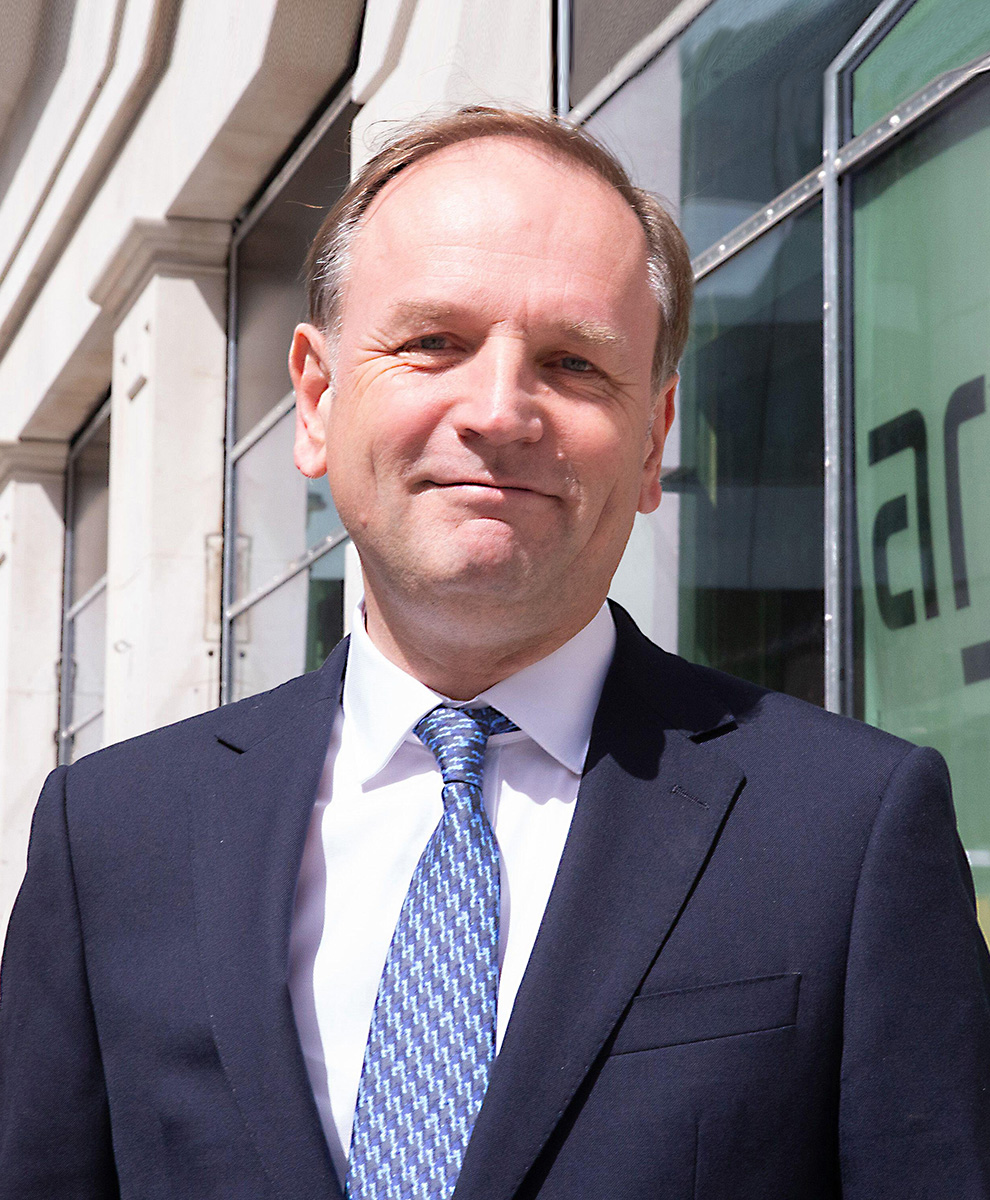
Sir Simon Stevens has come to be known as one of Britain's most influential, and controversial, NHS CEOs of recent years. Born in Birmingham on August 4th 1966, he was marked as an outstanding student, receiving a scholarship to Balliol College, Oxford University, studying PPE. He was elected president of the Oxford Union and became friends with current Prime Minister Boris Johnson. Following the completion of his degree and a one-year stint as an economic analyst in Guyana, Stevens began his career as a health care manager running hospitals, health commissioning organisations and primary care both in Britain and internationally. Few would have known that he would continue to be embroiled in the world of healthcare for most of his working life to date.
From 1997-2001 Stevens was appointed as a policy adviser to the Secretary of State for Health, a position which was filled by Frank Dobson and then later Alan Milburn. In parallel to his role as policy adviser, Stevens also sat as Labour councillor for Brixton, in the London Borough of Lambeth from 1998-2002, indicating that his advisory role was driven by more than just career progression. As policy adviser, Stevens became closely associated with the development of the NHS Plan 2000, a ten-year plan from the Blair ministry that set out commitments to an increase in funding for the NHS, along with a general rise in staff, beds and NHS centres. However, within the plan lay controversial intentions to incorporate the private sector into the NHS through independent sector treatment centres (ISTCs). These new privately run treatment centres were contracted to provide solely NHS elective procedures, for profit, creating a higher capacity within the system to reduce existing waiting lists.
The main aim of introducing the private sector to the NHS was far more fundamental than simply reducing the wait times for elective surgeries, it was about maintaining the social contract that underpinned the National Health Service's existence. At a time where greater portions of middle-class patients were opting out of state-provided health care in favour of faster, private alternatives, the idea that the NHS was paid by all and used by all came under threat. Incorporating elements of the private sector allowed the NHS to increase its capacity and treat more patients, allowing more patients to return to state-provided health care and buy into the social contract, whilst at the same time stemming the growth of the newly rising private healthcare sector.
However, despite being created with the intention of making the NHS more appealing to the public, NHS plan 2000, and by involvement Stevens, opened the floodgates to allow future politicians and parties to further privatise the NHS internally. The clearest example of this alarming trend was the Health and Social Care Act 2012, an act that established an official policy of competition within the NHS and removed the responsibility for the health of citizens from the Secretary of State for Health.
In 2001 Stevens was promoted to health policy adviser for Prime Minister Tony Blair, where areas of focus included reducing waiting time targets, extending competition and patient choice and the creation of foundation trusts. Stevens held this role until 2004 when he went on to work in UnitedHealth Group as vice president, a company that he had had frequent dealings with as Blair's adviser.
UnitedHealth Group is a major US-based health company, offering healthcare products and insurance services internationally. In 2020 the company's market value was $332.8 billion, making it the second-largest healthcare company by revenue and the largest insurance company by net premiums. Joining UnitedHealth in 2004 opened Stevens' career to new heights, and new controversies. Stevens' appointment to the company came at a time where UnitedHealth Group were launching a new European company, UnitedHealth Europe, which he was to be the President of. The mission of this new branch was to "serve European public health systems" by supporting their efforts to improve patient care, an area that Stevens had become familiar with during his time advising the Blair government
However, the transition from Blair's health policy adviser to president of a newly expanding private health and insurance company drew heavy criticism, particularly from those who had opposed the reforms which Stevens had devised in NHS Plan 2000. Just four months after Stevens' employment, concerns were being noted in internal Department of Health documents that US companies, including UnitedHealth, were mounting sophisticated lobbying operations with access to ministers. These concerns led to Cabinet Secretary Sir Andrew Turnbull barring Stevens, for a limited time, from lobbying for further contracts for UnitedHealth Group. However, this set-back, together with being labelled as another sign that the NHS was becoming further privatised, seemed to have little effect on the resolve of UnitedHealth Europe to continue to push into the European health arena.
In an interview in 2007, Stevens reaffirmed his interest in the development of the NHS, stating that what people would like is for "the pieces of reform being brought together and seen through". He also moved on to justify his focus on the American health system, commenting "for all its problems, there is often an ability in the States to innovate faster and really test new models of care", a sentiment that resonated deeply with his previous NHS reforms to introduce a higher level of competition to drive innovation.
Following a successful career as president of UnitedHealth Europe for two years, and a three-year stint as the CEO of Ovations Inc, a UnitedHealth subsidiary, Stevens became president of the Global Health Division within UnitedHealth Group. In his new position he would manage international operations, growth and M&A in 123 countries worldwide, more than half the globe. From the beginning of his employment as president of the Global Health Division to his departure, UnitedHealth group almost doubled its yearly revenue from $71.5 billion to $130.4 billion. Whatever opinions of Stevens' previous actions one might have, nobody can disagree that to manage and thrive in such a position requires a level of dedication and administrative skill that few possess.
During Stevens' latter years of employment by UnitedHealth he also spoke on behalf of the Alliance For Healthcare Competitiveness, a Transatlantic Trade and Investment Partnership lobby group. In one of his representations for the group, he stated that "The worldwide need for health care in ageing populations will lead to a demand for goods and services that can drive sales of American insurance, medical devices and record-keeping technology". Whilst it is undeniable that in his capacity as president of the Global Health Division Stevens focus was on furthering the expansion of private health care companies and their entrance to new markets, it would be untrue to say he performed his role without consideration for patients' wellbeing and quality of care. In the same speech as the previous quote, he commented "This is about making it easier for patients around the world to benefit from things that have demonstrably worked", a way of thinking that had served Stevens throughout his life, data over sentiment.
After 10 years in the front seats of one of America's largest health providers, Stevens finally returned to the old familiar NHS, though in a markedly different position. Simon Stevens, at the time not a knight, was to replace Sir David Nicholson on April 1st 2014. Said to be chosen for his years of experience in healthcare globally and familiarity with the NHS's values by Sir Malcolm Grant, another former NHS chief, the stage was set for what will be remembered as one of the most turbulent periods in the NHS for decades.
One of Stevens' first moves was to commission office spaces in NHS bases in London for himself and several other leading NHS staff. The decision came with the intention to be closer to ministers and other national health bodies, a contrast with his predecessor, who opted to spend most of his time in the administrative headquarters in Leeds. However, before even entering the offices he had agreed to take a voluntary pay cut of 10% in light of "NHS spending pressures", an attempt to show that he was in the same boat as everybody else now. A gesture that did little to calm the fears of those who had marked him as an agent of privatisation.
For his first major act as the head of the NHS, Stevens released the Five Year Forward View in October 2014, a policy document that laid out clear plans for the future of the NHS. Key among these plans was to majorly increase government financing of the NHS, the report made it clear that the government would have to increase funding by £8 billion by 2020, a target that would allow £22 billion in annual savings by 2021. The call for a higher level of funding was celebrated by all, other than politicians, and would be echoed throughout his tenure as the head of the NHS, mainly due to government's failure to provide.
Funding wasn't the only element of the Five Year Forward View, integration of primary and specialist care, physical and mental health services, and NHS and social care played a large role in the document. The intention was to connect local care practices to cut inequalities and to improve the health of the population. From April this year the whole country is covered by the Integrated Care Systems, largely due to the pandemic acting as a catalyst to drive the process.
In 2016, in the upheaval that was the Brexit referendum, Stevens weighed in on the political stage, stating that Brexit would be "very dangerous if at precisely the moment the NHS is going to need extra funding actually the economy goes into a tailspin and that funding is not there". He was talking about the fears of the post-Brexit recession and how he found it unlikely that the promise of £350 million weekly would be achievable. Though Stevens' rejection of the Brexit proposal was on a greater level than just the financial side, he also commented that the NHS had seen "enormous" benefits from the 130,000 EU nurses, doctors and care-workers over the years.
The dedication that Sir Simon Stevens showed to the NHS's mission to increase its funds was finally politically recognised in 2019 as Theresa May co-published the NHS Long Term Plan, also known as the NHS 10-Year Plan, with him. Finally the NHS budget was to increase by £20 billion a year by 2023, or 3.5%. However, despite the apparent victory many criticised the plan for being lower than the average rise of 4% in developed countries worldwide. The plan was also heavily criticised for not addressing the shortages of clinicians, with the Financial Times commenting "Nothing much will change until the NHS begins to fill an estimated 100,000 vacancies".
One thing that did come out of the NHS Long Term Plan was an end to one of Stevens' more controversial legacies. As earlier mentioned, NHS Plan 2000 paved the way for the Health and Social Care Act 2012, opening up the NHS for a policy of competition. The Long Term Plan put an end to the explicit policy of competition within the NHS, finally absolving Stevens of the charge that he had intended for competition to take a hold of the NHS entirely.
It seems strange now to think that the start of 2019 was under a year away from the beginning of a global pandemic that would envelop the world for 17 months, and counting. At the time it was impossible to know that there would have been a pandemic, if we had there would have been a great deal done differently in the years leading up to 2020. However, when on January 30th 2020 a global pandemic was announced, the NHS, and therefore Sir Simon Stevens, acted immediately.
On the very same day as the pandemic was announced, the NHS declared a Level 4 National Incident, moving the country to its highest state of emergency and allowing the overarching body, NHS England, to take over the overall coordination of the health service's response to the pandemic. This put Stevens at the helm of the NHS's response to the storm that would soon occupy our lives to the present day.
However, despite the NHS's overall response to the pandemic being one of extreme resilience and immense sacrifice for the benefit of the public, it is Sir Simon Stevens' involvement in the vaccine rollout that is the crowning achievement of his career. Securing and delivering over 61 million doses of the Covid-19 vaccination in a climate of fear, political pressure and international dispute is a feat that few could have achieved, let alone excelled in. With the UK having almost double the total number of full vaccinations than other European nations, there is no doubt that Stevens' integrated care model is vindicated, at least on some level.
Without the ability to free up hospital beds, have increased communication between local health care providers and maintain a level of care outside of hospitals there is no doubt that the Covid-19 response and vaccine rollout could have been very different. If the NHS's response to the pandemic has been exemplary, then it has been in no small part due to Sir Simon Stevens' influence over the past seven years, no matter the political implications. With the foundations of the vaccine programme firmly in place, his decision to step down from his post in July comes at a time where there will be a reduced disruption to the programme.
Though the question that now needs answering is - 'what will he do next?' Downing Street has said that the former NHS chief would become a life peer in the House of Lords, but for now this is all we know, with no new insight as to where or what he will occupy himself with. One thing that is for sure is that NHS sources have said that they would likely appoint a successor who was less outspoken and less willing to challenge the government, a comment that serves to sum up Sir Simon Stevens' character well.






